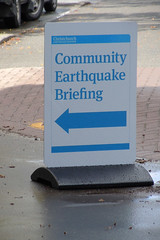
Search
Images for Community; more images...
Ruth Gardner's Blog 31/10/2010: Retropolitan Retirement
Articles, UC QuakeStudies
An entry from Ruth Gardner's blog for 31 October 2010 entitled, "Retropolitan Retirement".
Ruth Gardner's Blog 06/11/2010: Kilmore Cupcakes
Articles, UC QuakeStudies
An entry from Ruth Gardner's blog for 6 November 2010 entitled, "Kilmore Cupcakes".
Ruth Gardner's Blog 05/01/2012: Sunny Seaside
Articles, UC QuakeStudies
An entry from Ruth Gardner's blog for 5 January 2012 entitled, "Sunny Seaside".
Ruth Gardner's Blog 19/04/2013: Reading Room
Articles, UC QuakeStudies
An entry from Ruth Gardner's blog for 19 April 2013 entitled, "Reading Room".
Ruth Gardner's Blog 12/03/2013: Regular Routines
Articles, UC QuakeStudies
An entry from Ruth Gardner's blog for 12 March 2013 entitled, "Regular Routines".
Ruth Gardner's Blog 21/05/2011: Market Moved
Articles, UC QuakeStudies
An entry from Ruth Gardner's blog for 21 May 2011 entitled, "Market Moved".
Ruth Gardner's Blog 28/05/2011: Childhood Churches
Articles, UC QuakeStudies
An entry from Ruth Gardner's blog for 28 May 2011 entitled, "Childhood Churches".
We Lived Here: Rees Street Photograph 3
Images, UC QuakeStudies
A photograph of the house at 11 Rees Street.
We Lived Here: Oxford Terrace Photograph 005
Images, UC QuakeStudies
A photograph of the house at 370 Oxford Terrace.
We Lived Here: Oxford Terrace Photograph 007
Images, UC QuakeStudies
A photograph of the house at 458 Oxford Terrace.
We Lived Here: Oxford Terrace Photograph 052
Images, UC QuakeStudies
A photograph of the house at 412 Oxford Terrace.
Ruth Gardner's Blog 13/12/2013: Mysterious Mural
Articles, UC QuakeStudies
An entry from Ruth Gardner's Blog for 13 December 2013 entitled, "Mysterious Mural".
Ruth Gardner's Blog 22/01/2014: Poor Poplar
Articles, UC QuakeStudies
An entry from Ruth Gardner's Blog for 22 January 2014 entitled, "Poor Poplar".
We Lived Here: Bangor Street Photograph 01
Images, UC QuakeStudies
A photograph of the house at 56 Bangor Street.
We Lived Here: Rees Street Photograph 7
Images, UC QuakeStudies
A photograph of the house at 11 Rees Street.
We Lived Here: Oxford Terrace Photograph 027
Images, UC QuakeStudies
A photograph of the house at 398 Oxford Terrace.
We Lived Here: Oxford Terrace Photograph 113
Images, UC QuakeStudies
A photograph of the house at 398 Oxford Terrace.
We Lived Here: Oxford Terrace Photograph 125
Images, UC QuakeStudies
A photograph of the letterbox at 396 Oxford Terrace.
We Lived Here: Oxford Terrace Photograph 044
Images, UC QuakeStudies
A photograph of the house at 458 Oxford Terrace.
We Lived Here: Oxford Terrace Photograph 045
Images, UC QuakeStudies
A photograph of the house at 458 Oxford Terrace.
We Lived Here: Oxford Terrace Photograph 054
Images, UC QuakeStudies
A photograph of the house at 428 Oxford Terrace.
We Lived Here: Oxford Terrace Photograph 111
Images, UC QuakeStudies
A photograph of the house at 396 Oxford Terrace.
We Lived Here: Rees Street Photograph 2
Images, UC QuakeStudies
A photograph of the house at 7 Rees Street.
Lyttelton Review 4 July 2011
Articles, UC QuakeStudies
The "Lyttelton Review" newsletter for 4 July 2011, produced by the Lyttelton Harbour Information Centre.
Roz Johnson's Blog 23/02/2012: Helping Hands
Articles, UC QuakeStudies
An entry from Roz Johnson's blog for 23 February 2012 entitled, "Helping Hands".
Developing Local Partners in Emergency Planning and Management: Lyttleton …
Research papers, University of Canterbury Library
This research examines a surprising partner in emergency management - a local community time bank. Specifically, we explain the role of the Lyttelton Time Bank in promoting community resiliency following the Canterbury earthquakes in 2010 and 2011. A time bank is a grassroots exchange system in which members trade services non-reciprocally. This exchange model assumes that everyone has tradable skills and all labour is equal in value. One hour of any labour earns a member one time bank hour, which can be used to purchase another member’s services. Before the earthquakes struck, the Lyttelton Time Bank (TB) had organised over 10% of the town’s residents and 18 local organisations. It was documenting, developing, and mobilising skills to solve individual and collective problems. This report examines the Lyttelton Time Bank and its’ role before, during, and after the earthquakes based on the analysis of over three and a half years of fieldwork, observations, interviews, focus groups, trading activity, and secondary data.
Avalanche of legal cases emerging in wake of quake
Audio, Radio New Zealand
Christchurch's community law centre is braced for an avalanche of cases as people confront legal issues associated with the Canterbury earthquake.
Christchurch Earthquake - Hot Zone
Images, eqnz.chch.2010
A view after the 7.1 magnitude earthquake in Christchurch. Community of the Sacred Name, cnr St Asaph and Barbadoes Streets
Elizabeth Ackermann Photograph 185
Images, UC QuakeStudies
A photograph of a dusty monitor in an earthquake-damaged building on Poplar Street taken during the Residential Access Project. The Residential Access Project gave residents temporary access within the red-zone cordon in order to retrieve items from their homes after the 22 February 2011 earthquake. Dislodged bricks can also be seen around the monitor.
Elizabeth Ackermann Photograph 315
Images, UC QuakeStudies
A photograph of a sign in the Canterbury Quakes exhibition at the Canterbury Museum. The sign displays the first Christchurch earthquake tweet on twitter, "Quake!!!!!!".
